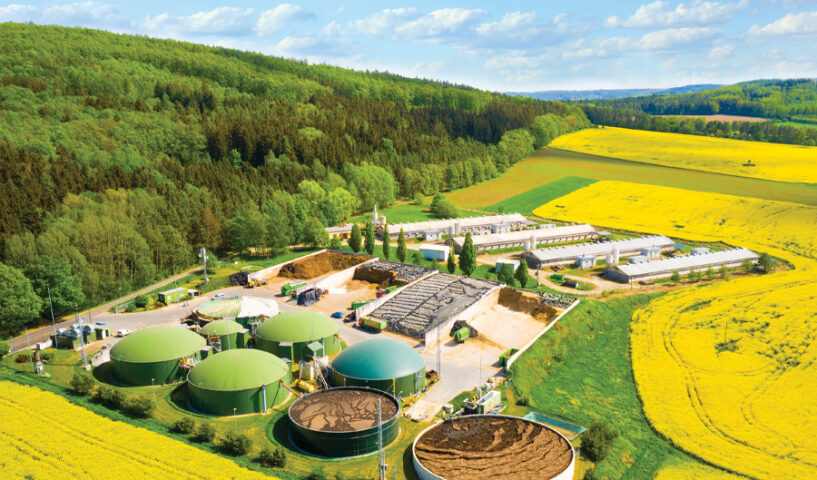
It is solar’s time to shine
9th October 2023
Environmental consenting
9th October 2023Europe’s biomethane journey

Biljana Kulišic, Policy Officer, Bioenergy, European Commission, outlines the state of play and scope for development of the European biomethane sector.
Taking stock in biomethane production in the European Union’s 27 member states, Kulišić explains that the Commission is using a “linear growth in production [of biomethane] based on the projections communicated in the national energy climate plans”.
“At the moment, 17 member states have reported their national energy climate plans (2020-2021), reflecting what has been implemented and challenges faced. In parallel, member states are submitting their bi-annual national energy and climate plans 2023-2030, looking forward towards the targets, given the past experiences. Collecting biomethane related ambitions from each member state would help us assess how far along we are on the 35bcm target. It is not going to be linear; it will be a bumpy road, especially as the first actual biomethane molecule will be available in 2026 at the earliest, if the investment is made today.”
Currently, biomethane is only produced in 15 out of the 27 EU member states. Kulišić describes Ireland’s biomethane sector as “small, but nonetheless existing”, as it contains small numbers of biomethane plants.
“Ireland is taking inspiration from Denmark which is the right thing to do,” she says. “Denmark took only eight years to come to 38 per cent of replacement of natural gas supplied by biomethane and has a plan to have fully phased out natural gas by 2027 from their gas grid system, so we see that this can be done. I am sure that Ireland, from its own experience of being a European champion in bioeconomy, has learned that it can be a champion and a forerunner in biomethane development rather than being a laggard.”
A united approach to a changing policy context
Praising Minister Eamon Ryan TD’s “brilliant leadership” in ensuring that Ireland plays a full role in the EU’s Biomethane Industrial Partnership, a public-private partnership between industry and the European Commission established to accelerate sustainable biomethane production, Kulišić, as a co-chair of Task Force 1 that is consisted of member state representatives, believes that a cohesive approach can be taken from all EU member states working together to enhance a network of civil servants “that would actually accelerate biomethane production in Europe”.
“Everyone knows that there is a fast-changing policy context. Energy security is a must for a country to have sovereignty. We want to have it to be not just independent and secure, but also green. This will help us to our net zero emissions targets,” she says.
“History has taught us that if we frame bioenergy related policies around only the energy content produced from that bioenergy, these policies tend to backfire in terms of neglecting what is done to the carbon sinks, embracing the renewable energy production byproducts in rural development, or how to mix energy with other policies and targets.”
Kulišić states that the visions among EU member states for their energy transitions are mostly “very much about electrification” but explains that some of the sectors that are difficult to abate through electricity will still remain and, therefore, there are going to be some renewable gases needed and limited use of fossil gas will remain necessary in the medium term. “Fossil gas in the perspective of the climate target may give us the least greenhouse-gas emitting fossil among the fossils, but it is not an excuse to not have renewable gases of our own origin.”
Trade of biomethane
With the European Union targeting 35 bcm of biomethane and biogas production by 2030, Kulišić outlines her belief that Ireland can have an important trading role as the quality of biomethane produced in Ireland is likely to be the most valuable, due to the fact that it will be primarily produced from manure rather than other feedstock.
“Industry estimates that there is a €2 billion total gross market margin by 2030. This will be linked with a carbon offset price meaning that a batch of biomethane produced from manure will have a better price than the batch of biomethane produced from food and feed feedstock,” she says.
Looking at how best to synchronise trading across the EU, Kulišić states: “Union database for biofuels has been established for biofuels, not just for biomethane but also for liquid biofuels in transport. This creates a positive synergy between guarantees of origin [GOs] and voluntary certification schemes [VCSs].
“GOs are an important mechanism carrying the information how much biomethane [in energy units] has been injected to the grid or used off-grid. VSCs are focused on biomethane sustainability criteria and minimum greenhouse gas emission thresholds [under Article 29, RED II], to be eligible to for public financing support and be attributed to the national RES targets.
“Ireland, from its own experience of being a European champion in bioeconomy, has learned that it can be a champion and a forerunner in biomethane development rather than being a laggard.”
“Combining GOs and VCSs, with the global mass-balance system would allow trading of sustainable biomethane. In reality, that means gas will flow through its own wave through the pipelines of different mixtures, but the trade will be happening with the global balance system.”
Concluding, Kulišić outlines that pump-priming investment is vital to ensure the long-term viability of the biomethane industry, with the sector still in an early stage of development.
“The inspirational country in terms of access to finance, although large, is Spain, which has been remarkable in combining the different aspects of the supply chain of biomethane. It is important to finance not just on the kWh but also by the digestate and biogenic CO2 to improve the business model and reduce the biomethane price.”
